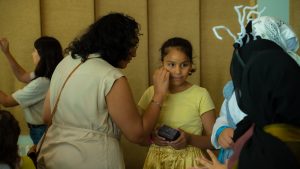Theatre as a Tool for Resistance
Hiba Hussein is Seenaryo’s Country Manager in Lebanon.
Art is vital, especially in these dark times – it allows us to express our feelings of anger, grief, disgust, hopelessness and pride. Through art, we can tell our stories and our history to the rest of the world. We open a dialogue with the other, break stereotypes and change narratives, arming ourselves with a political tool we can use to create change in our communities.
Your life as a Palestinian in Lebanon begins with no citizenship, no rights and with many stereotypes inflicted upon you.
As a Palestinian refugee who grew up in Beirut after the civil war, I learnt young that fighting the injustices that plague this region is incredibly challenging. Your life as a Palestinian in Lebanon begins with no citizenship, no rights and with many stereotypes inflicted upon you. You spend your childhood discovering the stories of your relatives who were expelled from their country and displaced many times after that.
My own relatives were expelled from their village in Safad by Israeli forces and displaced to Tyre, Saida, Beirut and Damascus. During the Lebanese Civil War, my parents joined the Palestinian Red Crescent’s medical team and in 1982 my father was held for four months in the notorious Ansar detention camp. A few years later, he was trapped again in the besieged Shatila camp in Beirut. Growing up with these stories, I came to learn that as a Palestinian I exist in a grey area of Lebanese labour law; we are categorised as foreigners, refused passports and excluded from many professions like law, medicine and engineering.
Although I’m geographically far from Gaza and the West Bank, everything I’ve been seeing over the past five months reminds me of what my relatives went through. The devastation is not only exposing the daily injustices inflicted on Palestinians, but also unveiling the history of our struggle for existence.

Soon after the devastating attack on Al Ahli Hospital in Gaza in October, our Seenaryo team – enraged and horrified by the huge loss of innocent life since 7 October – got together to decide how to respond to the catastrophe unfolding in our region. Individually we could strike and protest. But as an arts organisation, what role could we play?
We decided determinedly to continue doing what we know best: bringing theatre and play to the communities that need it most. Continuing our work against a backdrop of such violent devastation has not been easy, but resistance comes in many forms – and I personally believe that our existence is a form of resistance. Through theatre we are creating a space for communities to advocate locally and globally about the injustices they face.
Exploring experiences artistically and creatively not only alleviates the burden of these struggles, but also opens up the imagination to new possibilities.
My belief in art as a tool for resistance, change and peace has accompanied me throughout my life. Since I was young, I have always admired resistance art, from the songs of Ahmad Kaabour and Ziad El Rahbani, to Mahmoud Darwish’s poetry, Naji Al Ali’s cartoons and Banksy’s graffiti.
I joined Seenaryo because of my belief that art, and especially theatre, is powerful in contexts where communities don’t usually have a space to share their stories. Seenaryo brings together different communities to form an ensemble, creating a collaborative space where they can tackle topics not usually spoken about – and speak about them in front of an audience. Exploring experiences artistically and creatively not only alleviates the burden of these struggles, but also opens up the imagination to new possibilities.
Seenaryo has been making theatre with the Palestinian community in Lebanon since our founding in 2015. Our first ever Showbuild – and first ever project – in the summer of 2015 was with Yaabad Scouts, a community group active in Shatila refugee camp. Many of the children in that first play have gone on to train to become facilitators with us and a group of them twice toured their play I see my ghost coming from afar to theatres and festivals in Germany.
The future is uncertain for our Palestinian team members, partners and participants. But we will continue doing what we know best – creating this space of resistance and change for those who need it most.
